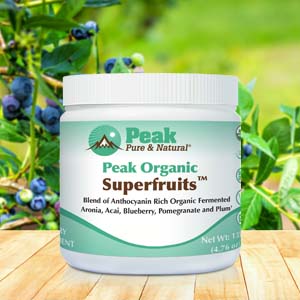Get Easy Health Digest™ in your inbox and don’t miss a thing when you subscribe today. Plus, get the free bonus report, Mother Nature’s Tips, Tricks and Remedies for Cholesterol, Blood Pressure & Blood Sugar as my way of saying welcome to the community!
Dangerous drug-resistant pathogen coming to your fruit bowl

We all know the old saying, “An apple a day keeps the doctor away.”
However, research published by the American Society for Microbiology is proving that modern food practices may be turning that much loved saying on its head.
In fact, apples and other fruits you pick up each time you go to the grocery store might send you running to the doctor or even the nearest emergency room — all because of a pathogenic yeast that can cause invasive infections, including bloodstream and wound infections.
The double-edged sword of freshness preservation
You see, decades ago when that old saying came into being, the apples people ate were fresh picked and packed with nutrients. And most importantly, they came without the chemicals that now coat the skin of the fruits we eat.
Today, apples and other fruits are prepared for transport by first treating them with a fungicide. The goal is to prevent spoilage and extend shelf life. This helps keep them fresh as they’re stored first in warehouses then on the trucks that cart them hundreds and thousands of miles and finally, on the shelves of your produce aisle.
While this might sound great in theory, there is a downside.
That’s because according to researchers the fungicides may help select and boost the transmission of pathogenic yeasts that are multi-drug resistant.
One such pathogen is Candida auris, which we warned you about a couple of years ago. The problem now is that it’s hitching a ride to your fruit bowl…
How dangerous is C. auris
To get an idea of how bad C. auris really is, here’s a look at what the CDC says about it…
Candida auris is an emerging fungus that presents a serious global health threat. CDC is concerned about C. auris for three main reasons:
- It is often multidrug-resistant, meaning that it is resistant to multiple antifungal drugs commonly used to treat Candida infections. Some strains are resistant to all three available classes of antifungals.
- It is difficult to identify with standard laboratory methods, and it can be misidentified in labs without specific technology. Misidentification may lead to inappropriate management.
- It has caused outbreaks in healthcare settings. For this reason, it is important to quickly identify C. auris in a hospitalized patient so that healthcare facilities can take special precautions to stop its spread.
Pretty scary, right?
Especially considering that research findings at the University of Delhi suggest apples could be a selective force for the pathogen — and help it to spread.
After testing 62 apples, including varieties like Red Delicious and Royal Gala, the scientists identified drug-resistant strains of C. auris on a total of 8 apples (or 13%).
All the apples with the yeast had been stored before purchase, whereas not a single freshly picked apple hosted C. auris.
People with compromised immune systems, including the elderly and those who are already ill, hospitalized or in nursing homes are at the highest risk from C. auris infections.
But the CDC suggests that the risk factors for C. auris infections are generally similar to risk factors for other types of Candida infections — including recent surgery, diabetes, broad-spectrum antibiotic and antifungal use. Infections have been found in patients of all ages, from preterm infants to the elderly.
Eat your fruit carefully
With these results, you might be wondering whether it’s time to give up those so-called healthy apples. But don’t throw the baby out with the bathwater.
Fruit offers a variety of health benefits that you don’t want to miss out on. For example, apples may help lower LDL cholesterol and fight off diabetes.
And, researchers in China have found that people who eat 100 g of fruit each day are one-third less likely to die from cardiovascular disease.
So instead of giving up the benefits of these fruits, simply institute some safer habits…
This includes choosing organic fruit — or better yet, locally-grown organic fruit where possible. Even then ensure every apple or piece of fruit you eat is thoroughly washed to help clear away dangerous pathogens, like C. auris.
This way, you can keep the truth in that that old saying — an apple a day keeps the doctor away.
Editor’s note: Are you feeling unusually tired? You may think this is normal aging, but the problem could be your master hormone. When it’s not working, your risk of age-related diseases skyrockets. To reset what many call “the trigger for all disease” and live better, longer, click here to discover The Insulin Factor: How to Repair Your Body’s Master Controller and Conquer Chronic Disease!
Sources:
Apples and other fruits can host drug-resistant, pathogenic yeasts on surfaces, study finds – ScienceDaily
Candida Auris – CDC













